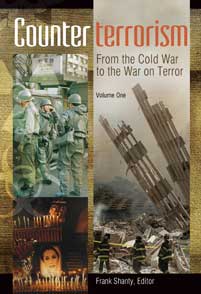| |
Pris: 1247 SEK exkl. moms  |  This two-volume set examines modern nation-state legislative, diplomatic, military, and non-military attempts to combat terrorism within and outside state borders. The articles which comprise this comprehensive reference work address counterterrorism efforts employed by the international community prior to and following the events of September 11, 2001. This two-volume set examines modern nation-state legislative, diplomatic, military, and non-military attempts to combat terrorism within and outside state borders. The articles which comprise this comprehensive reference work address counterterrorism efforts employed by the international community prior to and following the events of September 11, 2001.
Terrorism in the 21st century is a serious global security challenge—one that has the potential to further proliferate into a much larger and more dangerous problem as militant organizations seek to acquire weapons and technologies capable of killing and maiming hundreds of thousands of people in one attack. The current international threat is not limited to a single isolated incident of violence perpetrated by a few angry and misguided individuals. During the past decade, the international community has collectively been engaged in a war with an ever expanding global movement of like-minded jihadists whose modus operandi has involved well-planned, coordinated, and operationally successful attacks on military and civilian targets.
Global terrorism in the 21st century threatens the foundations of secular democracies and directly challenges global security thereby raising new and critical issues that transcend national borders. This two-volume reference carefully examines threats such as Weapons of Mass Destruction (WMD) terrorism, agro-environmental terrorism, and energy-related terrorism, and discusses technologies and strategies—such as the use of biometrics, data mining, information systems, psychological profiling, and terrorists rehabilitation efforts—to mitigate these threats.
Counterterrorism: From the Cold War to the War on Terror provides an easy-to-read discussion of some of the principal issues involved in combating contemporary terrorism. Information is presented in non-technical language, making it appealing to the general reader as well as a solid reference for undergraduate college students and researchers. Following each article are references to other articles of interest and a comprehensive index facilitates access to specific subject material. The second volume includes a compilation of significant national and international treaties, laws, conventions, and protocols that have been implemented in an attempt to counter these ongoing threats to domestic and international security.
Features
• An evaluation of the evolution and effectiveness of select nation-state counterterrorism policies post-1945
• An examination of major issues and lessons-learned relative to the "Global War on Terrorism"
• Discussion of historical and contemporary global counterterrorism strategies and potential future counterterrorism challenges
Highlights
• Presents an in-depth discussion of the post-9/11 global counterterrorism campaign
• Highlights key issues impacting global counterterrorism strategy
• Provides a research agenda to address critical issues in counterterrorism
• Provides a glossary of key individuals and organizations | | |
|